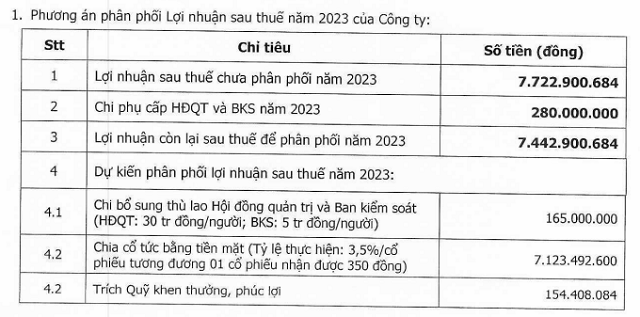
World Bank specialists at the report launch ceremony. (Photo: Vietnam+)
|
On the morning of April 23 in Hanoi, the World Bank (WB) held a press conference to Update the economic situation of Vietnam through the April edition entitled “Promoting Innovation and Entrepreneurship Startups.”
This is a special topic, emphasizing the essential role of innovative and creative enterprises in helping Vietnam realize its goal of becoming a high-income country by 2045. The WB’s report also notes that Vietnam’s economy is showing different signs of recovery and forecasts that economic growth will reach 5.5% in 2024 and gradually increase to 6% in 2025.
Exports are recovering
Speaking at the report launch, Ms. Dorsati Madani – senior economist WB in Vietnam said that after experiencing a period of slowdown in 2023, the economy is showing some signs of recovery in early 2024. Exports are recovering, while domestic consumption and private investment are also on the rise.
Accordingly, exports at comparable prices are projected to grow by 3.5% this year compared to 2023, reflecting improving global demand.
According to Ms. Dorsati Madani, exports of industrial manufactured goods will recover quite well in 2024, thanks to growth recovering at 8.5% year-on-year in the fourth quarter of 2023 and 17.2% year-on-year in the first quarter of 2024, at the same time, global demand is also gradually improving.
Exports of industrial manufactured goods are and are expected to continue to recover in the next 2 years, based on forecasts of slight growth and import demand from major trading partner countries such as the United States, Europe and China.
Meanwhile, inflation is also forecast by WB experts to increase slightly to 3.5% in 2024 (from an average of 3.2% in 2023), mainly due to prices of state-managed items such as education and healthcare are expected to increase. However, with expectations of stable energy and raw material prices, the CPI is forecast to decrease to 3.0% in 2025 and 2026.
The WB report stresses the importance of continuing to support the economy through fiscal policy to consolidate the recovery. The report recommends accelerating the implementation of infrastructure investment projects funded by public resources. This will further stimulate the economy, with projections that each 1 percentage point increase in public investment as a percentage of GDP will increase GDP growth by 0.1 percentage points.
Mr. Sebastian Eckardt, World Bank’s East Asia and Pacific Regional Director for Macroeconomics, Trade and Investment, said: “Investing in public infrastructure projects creates many long-term benefits besides immediately stimulating the economy. Enhancing public investment management will also address critical infrastructure bottlenecks in energy, transport, and logistics, which are fundamental for Vietnam’s long-term economic growth.”
In addition, the real estate sector is also forecast to recover more strongly by the end of this year and next year, boosting domestic demand as investors and consumers gradually regain confidence.

The real estate market is forecast to turn upwards in late 2024 and early 2025 as the market freeze in the bond market eases and the Land Law issued in January 2024 takes effect from January 2025.
“As exports and the real estate market gradually recover, domestic demand is expected to improve from the second half of 2024 as investors and consumers regain confidence, with total investment and private consumption projected to increase by 5.5% and 5%, respectively,” the WB leader emphasized.
Meanwhile, regarding monetary policy, the room for further interest rate cuts is limited due to the difference in interest rates between the domestic and international markets.
Ms. Dorsati Madani said that it is still necessary to continue to have adaptable facilitation policies, but in practice, there is a difference between interest rates in Vietnam and in the world, especially in the United States.
“The room for next interest rate cuts is not much. Potentially, any next interest rate cut could put pressure on the exchange rate,” the WB expert warned.
According to WB experts, ensuring the stability of the financial sector remains paramount, with a focus on managing potential risks related to increasing bad debts, including those caused by falling asset values in the real estate market. The capital buffer of commercial banks is currently relatively thin and a downturn in the real estate market could further deplete their capital.
Three recommendations to nurture innovative startups
Also at the press conference, Mr. Đặng Quang Vinh, WB’s private sector senior specialist, said that the special topic of the report makes a number of recommendations to support innovative startups, contributing to Vietnam’s productivity growth.
Mr. Vinh shared that the report emphasizes the need for a more favorable environment as major structural barriers still exist in many areas, including legal barriers, growing skills shortages, low technology absorption rates and challenges in accessing early-stage financing.

Mr. Đặng Quang Vinh, WB’s private sector senior specialist, speaks at the press conference. (Photo: Vietnam+)
|
First, innovate the support program for the critical ecosystem (Program 844) in the direction of building investment-ready enterprises. This activity includes improving support mechanisms, facilitating private fund managers to establish domestic investment funds, and enhancing the capacity of ecosystem stakeholders such as incubators and accelerators.
Second, accelerate reforms to address legal barriers to domestic investment funds (Decree 38 on investment for innovative startups) and simplify procedures to facilitate investment from abroad to Vietnam and vice versa, especially investment in innovative startups.
Third, strengthen the contribution of academia and public research. Create conditions for universities and public research organizations to contribute to startups, through incubators, accelerators, and innovative startup training centers (through public-private partnership models).
The public research sector can play a greater role by modernizing the intellectual property and technology transfer framework, rewarding research efforts with commercialization potential, and building the capacity of universities and research organizations to effectively transfer technology to startups./.
Thúy Hà









































